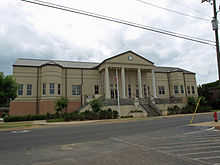Conecuh County, Alabama
| Conecuh County, Alabama | |
|---|---|

The Conecuh County Government Center in Evergreen
|
|
 Location in the U.S. state of Alabama |
|
 Alabama's location in the U.S. |
|
| Founded | February 13, 1818 |
| Seat | Evergreen |
| Largest city | Evergreen |
| Area | |
| • Total | 853 sq mi (2,209 km2) |
| • Land | 850 sq mi (2,201 km2) |
| • Water | 2.6 sq mi (7 km2), 0.3% |
| Population (est.) | |
| • (2015) | 12,672 |
| • Density | 16/sq mi (6/km²) |
| Congressional district | 2nd |
| Time zone | Central: UTC-6/-5 |
|
Footnotes:
|
|
Footnotes:
Conecuh County (kʌ'nɛkə) [p] is a county of the U.S. state of Alabama. As of the 2010 census the population was 13,228. Its county seat is Evergreen. Its name is believed to be derived from a Creek Indian term meaning "land of cane."
The areas along the rivers had been used by varying cultures of indigenous peoples for thousands of years. French and Spanish explorers encountered the historic Creek Indians. Later, British colonial traders developed relationships with the Creek, and several married high-status Creek women. As the tribe has a matrilineal system, children are considered born into their mother's clan and take their status from her family.
During the American Revolutionary War, the Upper Creek chief Alexander McGillvray (whose father was Scots) allied with the British, as he hoped to stop colonial American encroachment. Commissioned a colonel, he used Jean-Antoine Le Clerc, a French adventurer who lived with the Creek for 20 years, as his war chief to lead Creek warriors.
Conecuh County was established by European Americans on February 13, 1818. Some of its territory was taken in 1868 by the state legislature during the Reconstruction era to establish Escambia County. In the coastal plain, it was an area of plantations and cotton cultivation in the nineteenth century. It is still quite rural. Thousands of blacks left after 1940 in the Second Great Migration, especially for jobs in industry on the West Coast.
...
Wikipedia
